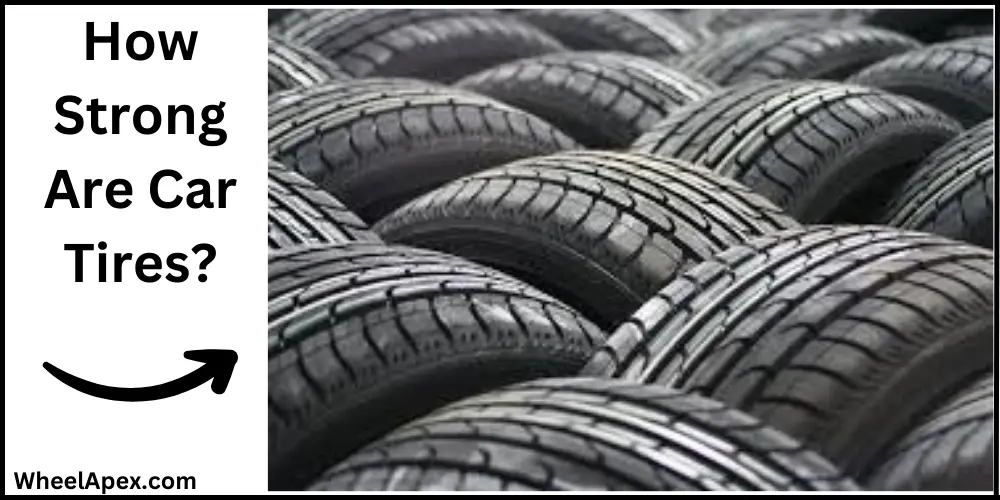Vehicle tires are many times underestimated, eclipsed by the great hardware they support and the adventure of the open street. Nonetheless, these honest elastic partners assume a critical part in guaranteeing a protected and happy driving experience. From exploring deceptive territories to enduring the persevering requests of regular use, vehicle tires are exposed to gigantic tensions and should have remarkable solidarity to convey ideal execution.
In this article, we dive into the universe of vehicle tires, How Strong Are Car Tires? investigating the key factors that decide their solidarity and versatility. From the materials used to their development and plan, we will uncover the privileged insights behind their capacity to persevere through the difficulties of the street.
Go along with us as we set out on an interesting excursion through the inward operations of vehicle tires, revealing insight into the innovation and design that go into making these crucial parts. Whether you’re a carefully prepared vehicle lover or just interested in the mechanics of your vehicle, this investigation of tire strength will leave you with a freshly discovered appreciation for these frequently neglected bosses of the street.
Thus, attach your safety belts and prepare to find exactly the way solid vehicle tires are and their valve caps.
How Strong Are Car Tires?
With regards to our vehicles, the significance of solid and dependable tires couldn’t possibly be more significant. These unpretentious elastic partners give the pivotal association between castles and the street, guaranteeing our well-being, solace, and execution.
Car tires are engineered to withstand a range of forces, offering robust durability and resilience to handle the vehicle’s weight and provide reliable traction, making them strong and reliable for various road conditions. However, their strength can vary based on factors like tire type, quality, and maintenance.
In any case, have you at any point pondered exactly How Strong Are Car Tires? Presently we dig into the interesting universe of auto tires to divulge the mysteries behind their solidarity, flexibility, and exceptional capacities.
The Life Structures of a Vehicle Tire
To comprehend the strength of vehicle tires, we should start by inspecting their life structures. A regular tire comprises a few layers, each assuming a fundamental part in its general exhibition. The furthest layer called the track, is the part that comes into direct contact with the street. It is planned with examples and furrows to give ideal footing and grasp, even in antagonistic atmospheric conditions.
Underneath the track lies a layer of texture ropes, generally made of polyester or nylon, which gives primary strength and keeps the tire from growing under tension. Further inside, there are steel belts that support the tire and upgrade strength and also they need valve caps. At long last, the deepest layer, known as the inward liner, goes about as a boundary to keep up with pneumatic force.

Strength Under Tension
Vehicle tires face colossal tension, straightforwardly. The heaviness of the vehicle, joined with the powers experienced during speed increase, slowing down, and cornering, put tremendous expectations on these elastic street heroes. The momentous strength of vehicle tires lies in their capacity to endure this strain while keeping up with shape, respectability, and usefulness.
The mix of tough materials, high-level assembling strategies, and designing skills guarantees that tires can bear weighty loads and persevere through testing street conditions, making them a fundamental well-being highlight for any vehicle.
Protection from Mileage
Vehicle tires get through a constant fight against mileage. Everyday experiences with street trash, unpleasant surfaces, potholes, and temperature vacillations put them under serious scrutiny. However, they show outstanding flexibility. The track compound, made of a blend of manufactured and regular elastic, is designed to oppose scraped spots and give a dependable grasp.
Also, tire makers utilize inventive advances, for example, silica-based mixtures and unique track plans, to upgrade footing, decrease moving opposition, and expand tire life. Routine upkeep, including appropriate filling and customary revolution, likewise adds to saving tire strength and life span.
Overcoming Assorted Street Conditions
Vehicle tires face a bunch of street conditions, from singing intensity to cold, from dry black-top to tricky surfaces. Their solidarity lies in their versatility. Different tire types, like summer, winter, and entire season tires, are explicitly designed to perform ideally in fluctuating climates and street conditions. For example, winter tires are planned with a particular elastic compound and track example to give a predominant foothold on snow and ice, guaranteeing well-being during cruel cold weather months. The adaptability of tire plans and the utilization of cutting-edge materials permit them to overcome different territories, conceding drivers a smooth and solid ride.
Security and Control
The strength of vehicle tires straightforwardly influences the security and control of the vehicle. A solid tire with incredible grasp and footing upgrades slowing down execution, mobility, and strength. It assumes a basic part in forestalling mishaps and keeping up with control during crisis circumstances. Tire producers put vigorously in innovative work to ceaselessly further develop security highlights, including the consolidation of advances like non-freezing stopping mechanisms (ABS) and tire pressure checking frameworks (TPMS), which further improve the strength and execution of vehicle tires.
FAQs
How Hard is it to Pop A Tire With A Knife?
Popping a tire with a blade is somewhat troublesome. Present-day tires are intended to endure penetrates and are made of numerous layers of extreme elastic and steel belts. While it’s not difficult to penetrate a tire with a blade, it commonly requires critical power and accuracy, making it a difficult errand.
What is The Hardness Of A Tire?
The hardness of a tire is regularly estimated on the Shore durometer scale, with values going from 0 (incredibly delicate) to 100 (very hard). Most vehicle tires fall inside the 50-70 Shore A reach, where higher qualities show more prominent hardness. This hardness influences footing, sturdiness, and ride solace.
How Long Will Tires Last On A Car?
The life expectancy of vehicle tires normally goes from 25,000 to 75,000 miles, contingent upon variables, for example, driving propensities, street conditions, tire support, and tire quality. All things considered, most tires last around 50,000 miles. Ordinary examinations, appropriate expansion, and turn can assist with augmenting their life span and security.
How Much Rubber is in A Car Tire?
An ordinary vehicle tire contains roughly 25-30% normal elastic, which gives versatility and sturdiness. The rest involves engineered elastic, supporting materials like steel or texture belts, and different synthetic mixtures for strength and execution. This equilibrium of materials guarantees tires can deal with assorted street conditions while keeping up with security and life span.
Conclusion:
Vehicle tires are something other than round elastic items. They are wonders of design, painstakingly created to endure colossal strain, overcome different street conditions, and guarantee the well-being and solace of drivers and travelers the same. The strength
also, flexibility of vehicle tires can be credited to the nature of materials, high-level assembling procedures, and persistent advancement in the auto business. In this way, the following time you hit the road, pause for a minute to see the value in the overlooked yet truly great individuals underneath your vehicle — the hearty, dependable, and unbelievably solid vehicle tires that keep you moving towards your objective with certainty.
Sources:
- By Ryan Schilling How are tires able to support the weight of a car? Posted 3 Years Ago.

